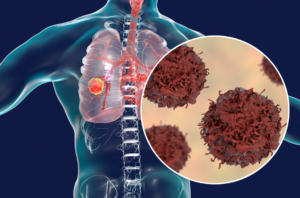Cigarette smoking has always been a part of the lifestyle for some individuals. Some smoke while drinking, during social events, to de-stress, or worse, they smoke because they have been doing it daily ever since they have tried it. Cigarette smoking is considered a top risk for lung cancer. Lung cancer occurs when abnormal cells in the lung grow in an uncontrolled manner. It often spreads (metastasises) to other parts of the body before the cancer can be detected in the lungs. Lung cancer is 1 of the 10 most common cancers in both men and women in Australia. (Source: www.canceraustralia.gov.au) It is also the most common cause of cancer death in men and in women in Western countries. Roughly one in seven patients with lung cancer were never smokers. Most sufferers of lung cancer who used to smoke, quit smoking long before their diagnosis.
This disease is called a “silent killer” because symptoms do not typically appear in the early stages of the disease. It is often diagnosed late as the lungs cannot be seen or felt, and lung tissue does not contain nerves that allow pain to be recognised. Some of the symptoms of lung cancer include coughing up blood, a new or changed cough that doesn’t go away, chest pain and/or shoulder pain or discomfort, shortness of breath, hoarse voice, loss of appetite, chest infection that doesn’t go away.
 Patients with lung cancer are often stigmatised because the disease is associated with smoking, seen by the public as a lifestyle choice. There are many other misconceptions about lung cancer such as:
Patients with lung cancer are often stigmatised because the disease is associated with smoking, seen by the public as a lifestyle choice. There are many other misconceptions about lung cancer such as:
- People who have never smoked do not get lung cancer – there are people diagnosed with lung cancer who never smoked
- Lung cancer is never curable – Early lung cancers are usually curable
- Lung cancer affects only old people – lung cancer is rare for young people, but it does occur
- Older people with lung cancer cannot be treated or cured
- It’s too late for me to quit smoking – it is never too late to quit smoking
November is Lung Cancer Awareness month and it’s vital that we become more aware of lung cancer symptoms to improve outcomes for those who are diagnosed. For more information, visit https://www.canrefer.org.au/teams/prince-of-wales-lung-cancer-mdt

